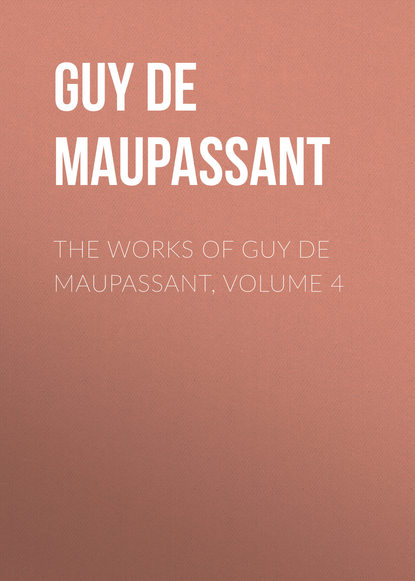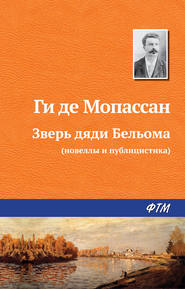По всем вопросам обращайтесь на: info@litportal.ru
(©) 2003-2024.
✖
The Works of Guy de Maupassant, Volume 4
Настройки чтения
Размер шрифта
Высота строк
Поля
And he, on the brink of tears, replied for the third time:
"I am named Simon."
The urchins fell a-laughing. The lad triumphantly lifted up his voice: "You can see plainly that he has no papa."
A deep silence ensued. The children were dumbfounded by this extraordinary, impossible monstrous thing – a boy who had not a papa; they looked upon him as a phenomenon, an unnatural being, and they felt that contempt, until then inexplicable, of their mothers for La Blanchotte grow upon them. As for Simon, he had propped himself against a tree to avoid falling and he remained as though struck to the earth by an irreparable disaster. He sought to explain, but he could think of no answer for them, to deny this horrible charge that he had no papa. At last he shouted at them quite recklessly: "Yes, I have one."
"Where is he?" demanded the boy.
Simon was silent, he did not know. The children roared, tremendously excited; and these sons of toil, most nearly related to animals, experienced that cruel craving which animates the fowls of a farm-yard to destroy one among themselves as soon as it is wounded. Simon suddenly espied a little neighbor, the son of a widow, whom he had always seen, as he himself was to be seen, quite alone with his mother.
"And no more have you," he said, "no more have you a papa."
"Yes," replied the other, "I have one."
"Where is he?" rejoined Simon.
"He is dead," declared the brat with superb dignity, "he is in the cemetery, is my papa."
A murmur of approval rose amidst the scapegraces, as if this fact of possessing a papa dead in a cemetery had caused their comrade to grow big enough to crush the other one who had no papa at all. And these rogues, whose fathers were for the most part evil-doers, drunkards, thieves and ill-treaters of their wives, hustled each other as they pressed closer and closer, as though they, the legitimate ones, would stifle in their pressure one who was beyond the law.
He who chanced to be next Simon suddenly put his tongue out at him with a waggish air and shouted at him:
"No papa! No papa!"
Simon seized him by the hair with both hands and set to work to demolish his legs with kicks, while he bit his cheek ferociously. A tremendous struggle ensued between the two combatants, and Simon found himself beaten, torn, bruised, rolled on the ground in the middle of the ring of applauding vagabonds. As he arose mechanically brushing his little blouse all covered with dust with his hand, some one shouted at him:
"Go and tell your Papa."
He then felt a great sinking in his heart. They were stronger than he was, they had beaten him and he had no answer to give them, for he knew well that it was true that he had no Papa. Full of pride he attempted for some moments to struggle against the tears which were suffocating him. He had a choking fit, and then without cries he commenced to weep with great sobs which shook him incessantly. Then a ferocious joy broke out among his enemies, and, naturally, just as with savages in their fearful festivals, they took each other by the hand and set about dancing in a circle about him as they repeated as a refrain:
"No Papa! No Papa!"
But Simon quite suddenly ceased sobbing. Frenzy overtook him. There were stones under his feet, he picked them up and with all his strength hurled them at his tormentors. Two or three were struck and rushed off yelling, and so formidable did he appear that the rest became panic stricken. Cowards, as a crowd always is in the presence of an exasperated man, they broke up and fled. Left alone, the little thing without a father set off running towards the fields, for a recollection had been awakened which brought his soul to a great determination. He made up his mind to drown himself in the river.
He remembered, in fact, that eight days before a poor devil who begged for his livelihood, had thrown himself into the water because he had no more money. Simon had been there when they had fished him out again; and the sight of the fellow, who usually seemed to him so miserable, and ugly, had then struck him – his pale cheeks, his long drenched beard and his open eyes being full of calm. The bystanders had said:
"He is dead."
And someone had said:
"He is quite happy now."
And Simon wished to drown himself also because he had no father, just like the wretched being who had no money.
He reached the neighborhood of the water and watched it flowing. Some fishes were sporting briskly in the clear stream and occasionally made a little bound and caught the flies flying on the surface. He stopped crying in order to watch them, for their housewifery interested him vastly. But, at intervals, as in the changes of a tempest, altering suddenly from tremendous gusts of wind, which snap off the trees and then lose themselves in the horizon, this thought would return to him with intense pain:
"I am about to drown myself because I have no Papa."
It was very warm and fine weather. The pleasant sunshine warmed the grass. The water shone like a mirror. And Simon enjoyed some minutes the happiness of that languor which follows weeping, in which he felt very desirous of falling asleep there upon the grass in the warmth.
A little green frog leapt from under his feet. He endeavored to catch it. It escaped him. He followed it and lost it three times following. At last he caught it by one of its hind legs and began to laugh as he saw the efforts the creature made to escape. It gathered itself up on its large legs and then with a violent spring suddenly stretched them out as stiff as two bars; while, its eye wide open in its round, golden circle, it beat the air with its front limbs which worked as though they were hands. It reminded him of a toy made with straight slips of wood nailed zigzag one on the other, which by a similar movement regulated the exercise of the little soldiers stuck thereon. Then he thought of his home and next of his mother, and overcome by a great sorrow he again began to weep. His limbs trembled; and he placed himself on his knees and said his prayers as before going to bed. But he was unable to finish them, for such hurried and violent sobs overtook him that he was completely overwhelmed. He thought no more, he no longer saw anything around him and was wholly taken up in crying.
Suddenly a heavy hand was placed upon his shoulder, and a rough voice asked him:
"What is it that causes you so much grief, my fine fellow?"
Simon turned round. A tall workman with a black beard and hair all curled, was staring at him good naturedly. He answered with his eyes and throat full of tears:
"They have beaten me … because … I … have no … Papa … no Papa."
"What!" said the man smiling, "why everybody has one."
The child answered painfully amidst his spasms of grief:
"But I … I … I have none."
Then the workman became serious. He had recognized La Blanchotte's son, and although but recently come to the neighborhood he had a vague idea of her history.
"Well," said he, "console yourself my boy, and come with me home to your mother. They will give you … a Papa."
And so they started on the way, the big one holding the little one by the hand, and the man smiled afresh, for he was not sorry to see this Blanchotte, who was, it was said, one of the prettiest girls of the country-side, and, perhaps, he said to himself, at the bottom of his heart, that a lass who had erred might very well err again.
They arrived in front of a little and very neat white house.
"There it is," exclaimed the child, and he cried "Mamma."
A woman appeared and the workman instantly left off smiling, for he at once perceived that there was no more fooling to be done with the tall pale girl who stood austerely at her door as though to defend from one man the threshold of that house where she had already been betrayed by another. Intimidated, his cap in his hand, he stammered out:
"See, madam, I have brought back your little boy who had lost himself near the river."
But Simon flung his arms about his mother's neck and told her, as he again began to cry:
"No, mamma, I wished to drown myself, because the others had beaten me … had beaten me … because I have no Papa."
A burning redness covered the young woman's cheeks, and, hurt to the quick, she embraced her child passionately, while the tears coursed down her face. The man, much moved, stood there, not knowing how to get away. But Simon suddenly ran to him and said:
"Will you be my Papa?"
A deep silence ensued. La Blanchotte, dumb and tortured with shame, leaned herself against the wall, both her hands upon her heart. The child seeing that no answer was made him, replied:
"If you do not wish it, I shall return to drown myself."
The workman took the matter as a jest and answered laughing:
"Why, yes, I wish it certainly."
"What is your name, then?" went on the child, "so that I may tell the others when they wish to know your name?"

















